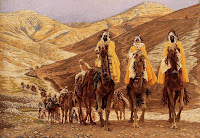(James Tissot, Journey of the Magi, 1894)
Today is the Feast Day of the Epiphany. It is the celebration of the arrival of the Magi who paid homage to the Christ Child offering to Him their gifts of gold, frankincense and myrrh. The word "epiphany" in our current culture carries a meaning of "a sudden realization or awareness of an idea or concept." The word, when broken down to its roots, "epi" or "heavenly apparition" and "phan" or "appears," means "the appearance of a god." In the case of the Christian Faith, it is the coming and recognition of Christ as the Son of God, God the Son.
Over the years, the arrival of the Magi and their adoration of Christ have been relegated to the final part of a typical Christmas pageant in any congregation across North America. The irony of the pageants is that Jesus was no longer a baby and no longer in the stable when the Magi arrived. The text is quite clear and very specific. "On entering the house, they saw the child with Mary his mother..." (Matthew 2:11) Greek is very specific. This is no longer a baby, but a child. They are no longer in the stable, but in a house. This is further supported by the fact that Herod orders the death of every male child under the age of two years old when he realizes that he has been ignored by the Magi. (Matthew 2:16)
It is incredibly unfortunate that this perplexing story with its unusual gifts has had its radical elements romanticized to meaninglessness. The first thing that grabs our attention is that we have this story in Matthew. It is in no other Gospels. Matthew, the Gospel that seeks to prove that Jesus is the Messiah, the Gospel that is written to appeal to the Jewish community about the "jewishness" of Jesus has a story about three Gentiles being the first to recognize and pay homage to the One who is anointed by God. It is a statement by Matthew of the radical inclusion of all people into God's Kingdom.
The second momentous revelation is the gifts brought by the Magi. Gold is the currency of kings. It is a sign of Christ's Kingship not just in Israel, but over the entire world. As we read through the Gospel, we are reminded of this gift of gold from the Magi as Jesus denounces the false Jewish leaders in Matthew 23:17. It is not the gold that is valuable, Jesus teaches, but the one who makes the gold sacred.
Frankincense, often used in Temple worship, was commonly used to rub on the bodies of those who had died. It is, for a modern observer, the ancient world's version of embalming fluid. Used in the death rituals of the day, it is a foreshadowing of Christ's death. Ironic that a Gentile from Persia brings the same kind of spice most likely used by Mary Magdalene and the other Mary brought with them to prepare Jesus' body on the first day of the week. (Matthew 28:1)
Myrrh, also used in Temple worship, was anciently mixed with bitter wine (vinegar) as a pain killer. It may have been the ingredient, the "gall," mixed in the wine given to Jesus while he was on the cross. (Matthew 27:34)
It is interesting that these three gifts find their way back into the story of Jesus' life and crucifixion. Yet, it is not the gifts that are so important. It is the one who makes these gifts sacred in His receiving of them. It is not even the Magi, who though they had strange ideas about the stars yet recognized a new cosmic order, but it is the one to whom they pay homage. I wonder, if for Matthew, the visitation of the Magi do not diminish Jesus' heritage as Son of David, as some might consider, but encourages the people to recognize God's ultimate will for humanity. In this stony valley where Bethlehem [which means "city of bread" from which came the Living Bread (John 6:51)] is nestled, a faint echo can be heard. From across the centuries, a promise made to Abram: "...and in you all the families of the earth shall be blessed." (Genesis 12:3c) Paul reminds us again of the promise given to Abram only a few verses later (Genesis 12:7) that it is to the "offspring" of Abram, a forebear of David, who is a forebear of Jesus, through which this blessing will be extended to all the earth. (Galatians 3:16)
Come, stand with the Magi and look at this child. Don't be distracted by the garments of ancient scholars, the look of foreign Magi or even the gifts of odd presentation. See the Christ Child. It is He who makes the garments we wear the vestments of wisdom. It is He who make the nations and races of the earth brothers and sisters. It is He who makes the gold, the signs of wealth and power, sacred. It is He who makes us sons and daughters of the Most High. Did you get it? Did you have your Epiphany? And suddenly the Epiphany comes. It is not about us. It is not about the Jews or the Gentiles. It is not about depths of wisdom or positions of power and prestige. It is about Jesus who is the Christ. Suddenly, it happens. The Body of Christ, the Church, is not here for me or my pleasure, but I am in the Church, I am, with you, the Body of Christ. Together, we are the continuation of the revelation of the Son of God, God the Son, whom the wise still seek and the arrogant and pitiful powers of temporal existence still seek to kill. It is Epiphany. Do you get it?





